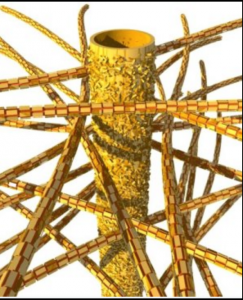Dentin Nanostructures: A ‘Super-natural’ Phenomenon
Why it is superior to any synthetic filling material at making teeth last
“Dentin is one of the most durable biological materials in the human body. The mechanical coupling between the collagen protein fibers and mineral nanoparticles renders dentin capable of withstanding extreme forces.
In humans, teeth come into contact almost 5,000 times per day under normal use. In spite of this, and although we often use large forces during mastication, it is surprisingly rare for healthy teeth to break. It is widely accepted that the design of teeth makes teeth tough, where an inner core, known as dentin, supports the outer hard enamel cap. The secret to the marked toughness lies in the structural details. Dentin is bone-like substance, which is composed of mineral nanoparticles, collagen, and water. While both enamel and dentin are composed of the same mineral called carbonated hydroxyapatite (cHAP), dentin represents a complex nanocomposite material.
Compression stress found within the material can explain why damage or cracks in enamel do not extend catastrophically into the dentin bulk. As part of the new findings, a research team used samples of human teeth to measure how nanoparticles and collagen fibers interact under humidity-driven stress.
As part of their experiments, the researchers increased the compressive stress inside the dentin samples. The samples were also dried by heating them to 125 degrees Celsius. This resulted in the collagen fibers shrinking, leading to huge stress being exerted on the nanoparticles. Heat treatment did not lead to the destruction of the protein fibers, suggesting that the mineral nanoparticles also have a protective effect on collagen.
‘Dentin’s morphology is considerably more complex than we expected. Enamle is very strong, but also brittle. In contrast, the organic fibers found in dentin appear to exert exactly the right pressure on the mineral nanoparticles that is required to increase the mineral’s repetitive, cyclic load-bearing capacity,’ argue the scientists. At least, this is the case as long as the tooth remains intact. Bacteria that cause dental decay soften and dissolve the mineral, and produce enzymes that destroy collagen fibers. Teeth become more fragile as a result and can then break more easily.”
To read more about this study, please go to https://www.sciencedaily.com/releas…/2016/…/160602122029.htm

